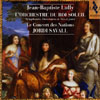Lully Symphonies, Ouvertures & Airs à jouer
It is amazing to realize how far Lully's music has become such a familiar part of the post-modern soundscape
View record and artist detailsRecord and Artist Details
Composer or Director: Jean-Baptiste Lully
Genre:
Orchestral
Label: Alia Vox
Magazine Review Date: 12/1999
Media Format: CD or Download
Media Runtime: 64
Mastering:
Stereo
DDD
Catalogue Number: AV9807

Tracks:
| Composition | Artist Credit |
|---|---|
| (Le) Divertissement Royal |
Jean-Baptiste Lully, Composer
(Le) Concert des Nations Jean-Baptiste Lully, Composer Jordi Savall, Conductor |
| Alceste (ou le triomphe d'Alcide), Movement: Suite |
Jean-Baptiste Lully, Composer
(Le) Concert des Nations Jean-Baptiste Lully, Composer Jordi Savall, Conductor |
| (Le) Bourgeois gentilhomme, Movement: Suite |
Jean-Baptiste Lully, Composer
(Le) Concert des Nations Jean-Baptiste Lully, Composer Jordi Savall, Conductor |
Author: Julie Anne Sadie
Conceived for the pleasure and prestige of one of the wealthiest and certainly one of the most culturally conscious monarchs in Western history, the music of Lully and emulators was nevertheless one of the last baroque repertories to be explored. Those musicians, like Jordi Savall, who have devoted much of their careers to French music of this era, perform it with a fluency and understanding unprecedented since the demise of the ancien regime. We, today's listeners, are the beneficiaries of this extraordinary revival.
Le Concert des Nations offers here a compendium of Lully's music from the heyday of the court of Louis XIV (widely assumed to have been at Versailles, but in fact from before the move from Paris). The pieces, drawn from a variety of Lullian sources to make up three entertainments (or divertissements), provide Savall with opportunities to present his musicians in Lully's spectrum of ensemble textures. The players respond to the rhythmic vitality of the music, adding ornamentation with tremendous precision and flair (might Lully have censored it, one wonders?), but the secret of the obvious success of this recording is the rightness of the tempos, whether for a dance, a battle, a gust of wind or a funeral.
Those who saw the film Tous les matins du monde (or own the CD of the soundtrack) will be familiar with Lully's 'March pour la Ceremonie turque' and will immediately hear the difference even a few years has made to Savall: the playing on this new recording more effectively captures the military character without caricaturing the janissary element. The real stars of the recording, however, are the percussion players, Michele Claude and Pedro Estevan, whose command of the possibilities for accompanying this repertory would have impressed even Lully (there are almost no indications given in the scores themselves).
Whole evenings of Lully are still an acquired taste, but a recording of highlights as good as this is something anyone who enjoys baroque music would wish to own.'
Le Concert des Nations offers here a compendium of Lully's music from the heyday of the court of Louis XIV (widely assumed to have been at Versailles, but in fact from before the move from Paris). The pieces, drawn from a variety of Lullian sources to make up three entertainments (or divertissements), provide Savall with opportunities to present his musicians in Lully's spectrum of ensemble textures. The players respond to the rhythmic vitality of the music, adding ornamentation with tremendous precision and flair (might Lully have censored it, one wonders?), but the secret of the obvious success of this recording is the rightness of the tempos, whether for a dance, a battle, a gust of wind or a funeral.
Those who saw the film Tous les matins du monde (or own the CD of the soundtrack) will be familiar with Lully's 'March pour la Ceremonie turque' and will immediately hear the difference even a few years has made to Savall: the playing on this new recording more effectively captures the military character without caricaturing the janissary element. The real stars of the recording, however, are the percussion players, Michele Claude and Pedro Estevan, whose command of the possibilities for accompanying this repertory would have impressed even Lully (there are almost no indications given in the scores themselves).
Whole evenings of Lully are still an acquired taste, but a recording of highlights as good as this is something anyone who enjoys baroque music would wish to own.'
Discover the world's largest classical music catalogue with Presto Music.

Gramophone Digital Club
- Digital Edition
- Digital Archive
- Reviews Database
- Full website access
From £8.75 / month
Subscribe
Gramophone Full Club
- Print Edition
- Digital Edition
- Digital Archive
- Reviews Database
- Full website access
From £11.00 / month
Subscribe
If you are a library, university or other organisation that would be interested in an institutional subscription to Gramophone please click here for further information.




